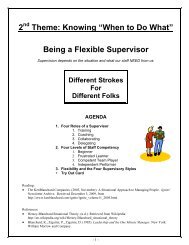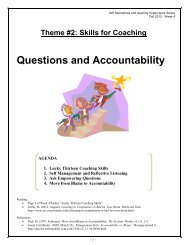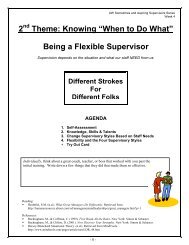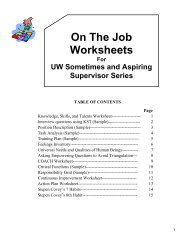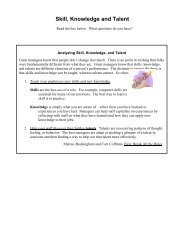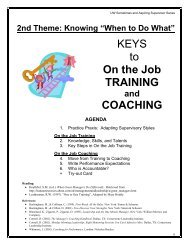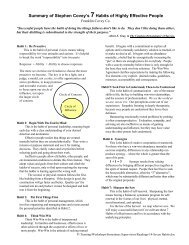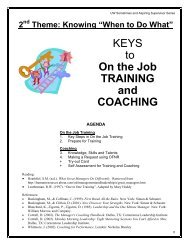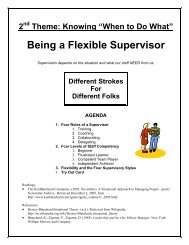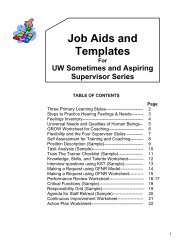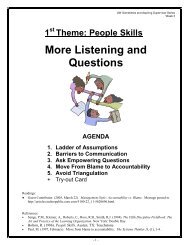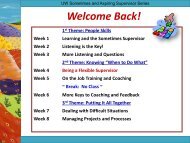You might be wondering, "If that's the list of 'no-no's,' what is okay to do?"A nice neutral gesture has your hands in the center of your body, around belt height, with the fingertipslightly touching as if you're cradling a fragile glass ball. If that particular hand position feels awkward, findone that suits you better, but be cautious about hands clutching or grinding on each other. Your neutral gestureshould look relaxed.More importantly, when you do gesture, are your hands breaking your silhouette? They should. A small handflick that stays within the imaginary outline of your body does not earn the title of gesture. Push your comfortand gesture larger than feels comfortable. Ask people you trust whether your gestures look too big or unnatural.Odds are they'll look just fine. If your energy is upbeat and flowing freely, it is almost impossible to gesture toobroadly.If your concern is about using your hands too much, don't worry. You might be gesturing a lot, but that's not amajor reason to worry. Only worry if you find that you're making the same gesture over and over and over andover. Any repetitive behavior effects us like the monotonous clickety-click of a train. So mix it up and create awide array of gestures. That way your watchers won't be reaching for their mental remotes trying to changeyour channel.PHYSICAL PRESENCE or MOVEMENTEven the most senior level businesswomen are reluctant to adopt a small physical adjustment when presenting.The tendency for most presenters, even more pronounced in women, is to stand with their feet closer togetherthan their shoulders. Imagine a building wider at the top than at the base. Not a very solid image, is it?Spreading your feet as far apart as your shoulders may at first feel like you're imitating a wrestler on cable, butthis simple action can help ground you. It certainly will give you a more powerful look.When you're actually presenting, try to become aware of who you are physically. You might be a hip-swayer.Or you could be a knee-bouncer. Possibly you're one of the ever-popular move-shufflers, repeating a smallpattern of steps over and over as if it were a ritual dance. Or you might be the time honored slow-ambler. Theseseemingly calm presenters simply move continuously through their presentation space as if their private mantrawere: "It's hard to hit a moving target.None of these movement styles are going to have your watchers running screaming from the room, but they'renot going to enhance your look of leadership either. Think of it this way: any generalized, non-specificmovement is probably unconscious and habitual, like saying "um" with your body. If it doesn't add value, whydo it?The preferred style of movement has intention attached to it. One way to accomplish this is to feel confident instillness. For some people this can be even more difficult than being comfortable with silence. Spread your feetas far apart as your shoulders and put your weight over your toes, as if you're ready to spring forward. Then,when you make eye contact with someone, walk towards them.When you're at a comfortable distance from them, hang out there in that same feet-at-shoulder-width stance.Keep looking around and connecting with people. Then, next time you move, move towards someone else asyou look at them. Think of it this way. Habitual, generalized movement is like fluorescent lighting. It's2
oadband illumination, serviceable but not terribly attractive. Movement that has intention attached to it is likea laser, focused and powerful. Which would you rather be?II. VERBAL:CONCISE = SUCCESSExpressing ideas out loud for the very first time is exciting. It's like exploring a plot of land. You make yourway around the perimeter, viewing it from all angles. Then you make tentative prods to see what's beneath thesurface. Sometimes you end up back on the perimeter for another view or abandon the place altogether for awhole new plot. It's a fun process. Unless you're the listener.Under our definition of a presentation, you shouldn't need to do your exploring in front of other people. Theadvantage is that being concise is one of the most highly prized attributes of the effective communicator.To be concise you need to be able to deliver your last line first.It's said that when Jack Welch ran General Electric he asked presenters, "Do you have a summary slide?" Whenthey said yes, he said, "Show me that first." This is a terrific lesson, especially if you're communicatingupwards. Ask yourself, what point am I really trying to make? Then speak that first. All your reasons andsupporting data can come later.If you hear yourself beginning to repeat an idea, stop. That's right. Simply stop talking. Saying an idea out louda second time helps YOU clarify your thinking, it does not add value for your listeners. Think about it silentlyuntil you can summarize it in a sentence.As you challenge yourself to become more concise, you'll find yourself able to preface your remarks withframeworks like, "I have two different ideas regarding this," or "My thought connects directly with what Robinsaid."The sound of leadership is concise. Get to your bottom line. Say it once. Stop talking.People will listen.NONWORDS: ER'S AND AH'SNon-words are unconscious, habitual behaviors. They are highly personalized, individual marks of distinction.For example, some people have a perfectly articulated, resonant "um" at the head of their sentences. Others useonly the less distinct interior "uh." Often the word "and" becomes a non-word, linking idea after idea after ideain a run-on sentence that becomes unmanageable. Other non-words are actual phrases, such as "d'y'know what Imean" or "in a manner of speaking." No matter what the non-word, it is better left unsaid.The only way to reduce or eliminate non-words is to create a feedback loop. You might put a cassette recorderon your desk and hit the record button before you answer or dial the phone. Play back the tape on your wayhome from work. You'll be astonished. A week of that will change your habits fast!3



